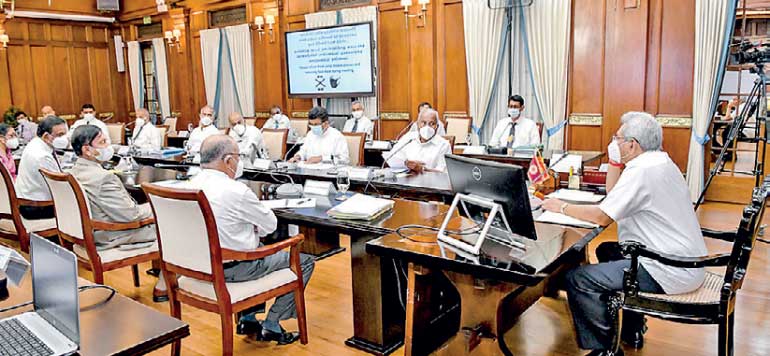Monday Feb 16, 2026
Monday Feb 16, 2026
Tuesday, 11 January 2022 03:42 - - {{hitsCtrl.values.hits}}

By Charumini de Silva
The Government yesterday assured uninterrupted electricity as opposed to the previous announcement, as authorities have managed to resolve multiple issues.
These developments were following an emergency meeting chaired by President Gotabaya Rajapaksa along with top ministers and officials to find solutions to the existing energy crisis without burdening the general public yesterday.
Power Minister Gamini Lokuge, Energy Minister Udaya Gammanpila, State Minister Duminda Dissanayake, Finance Ministry Secretary S.R. Attygalle, Central Bank Ajith Nivard Cabraal, Secretary to the President P.B. Jayasundera, Power and Energy Ministry Secretaries and the heads of the relevant line institutions attended the emergency meeting.
The Daily FT learns that the Central Bank has agreed to release the necessary foreign exchange to the Ceylon Electricity Board (CEB) via commercial banks to import required quantities of coal for power generation.
Previously, the Public Utilities Commission of Sri Lanka (PUCSL) gave the nod to Ceylon Electricity Board (CEB) for scheduled power cuts from Monday. Some of the key reasons for the massive 800 MW breakdown in supply include plant repairs, fuel shortage, increased electricity demand, escalated foreign exchange crisis, insufficient renewable power supply during night-time peak hours and accumulated debt by the general public to the CEB. This also includes a combined power shortage of 550 MW at Kerawalapitiya and Yugadanavi due to maintenance.
Energy Minister Udaya Gammanpila confirmed that Ceylon Petroleum Corporation (CPC) has agreed to provide 11,000 tons of furnace oil to Ceylon Electricity Board (CEB) till 22 January with a view to manage the existing power crisis.
“We have agreed to provide 1,000 tons of furnace oil to the CEB on a daily basis till 22 January. The decision was made to minimise the economic and livelihood disruption,” Minister Gammanpila told the Daily FT.
He also said that the CEB is confident of fixing the malfunctioning power generators by 22 January.
Amidst an escalating foreign exchange crisis in the country, Minister Gammanpila last month cautioned that the situation had gotten worse, as State-owned enterprises (SOEs) such as SriLankan Airlines, CEB and individual power generating firms owe a large sum to the CPC.
Separately, CPC Chairman Sumith Wijesinghe told the Daily FT that they have started issuing furnace oil to the CEB from yesterday, on a conditional basis.
“We agreed to supply furnace oil, as this is an emergency situation in the country. However, the decision was made only after CEB agreed to settle Rs. 18 billion out of its total due amount of Rs. 91 billion,” he explained.
The State-run CPC currently has a stockpile of 50,000 tons of furnace oil, equivalent for a month’s consumption.
The CPC Chief also said that a decision has been reached to resume operations at the Sapugaskanda Oil Refinery on 26 January, as a shipment of crude oil is scheduled to reach on 23 January.
“Steps will be taken to resume operations at the Sapugaskanda refinery, as promised earlier,” Wijesinghe added.
The Sapugaskanda Oil Refinery was temporarily closed on 3 January, due to the prevailing foreign exchange crisis.
Public Utilities Commission (PUCSL) Chairman Janaka Ratnayake told the Daily FT that the CEB has been directed to take all possible measures to ensure power plants which are under forced outage and partially available conditions, to meet the demand by 13 January.
“The PUCSL granted approval to the Ceylon Electricity Board (CEB) for scheduled power cuts only for three days, after considering their dire status and on a conditional basis. Thus, the decision will be reviewed in three days,” he said.
Ratnayake said that he will soon begin discussions with State and private entities that have a collective generator power supply of 2,000 MW soon, to be connected into the national grid given the emergency situation.
He also said that the Commission will use the provisions of the PUCSL Act to highlight any wrongdoing by triggering a public hearing on countrywide power outages.
Noting that PUCSL intends to protect all stakeholders, Ratnayake reminded consumers that they need to pay their dues as responsible citizens, to enjoy uninterrupted electricity supply.
“The CEB is running at a loss, because it has been providing electricity at a concessionary rate for the past seven years. It is the cheapest unit price for electricity in the South Asian region also. In that context, a colossal amount to the tune of Rs. 43 billion defaulted by customers of the CEB is unfair by the supplier.
“The CEB needs to come out of the financial crisis, it is grappling currently with cheap rates. It is an act of balance by both supplier and the customer. If the supplier is in a financially viable position, it could provide a better service,” he explained.